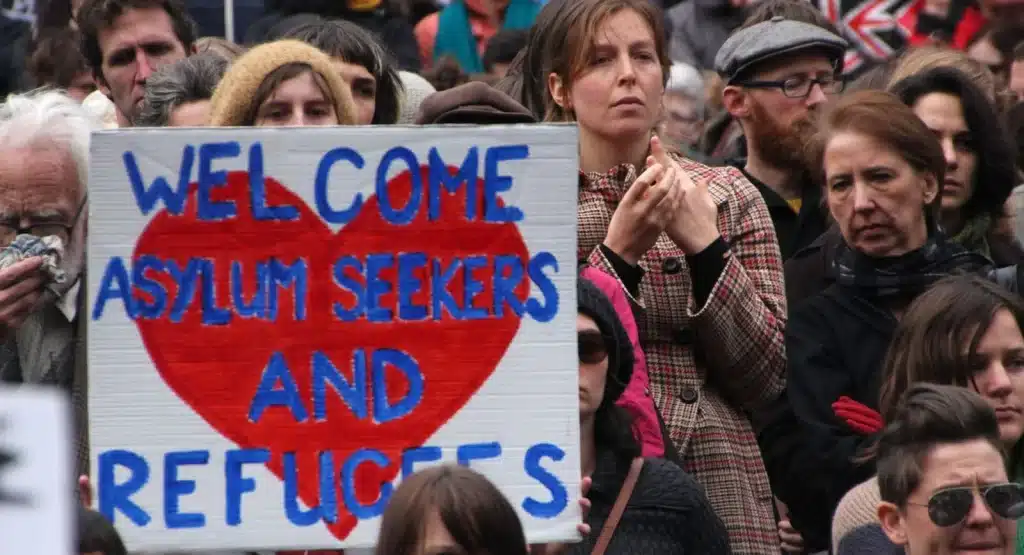New Bill risks undermining human rights for people seeking asylum
Under the government’s new Bill to strengthen community safety and prevent hate, discrimination and violence, Bill, visas could be cancelled… Read More

This month we’ve seen the double gutpunch of a Trump triumph overseas, and the introduction of a draconian new deportation bill here in Australia.
Labor’s knee-jerk legislation, which could allow refugees to be sent to third countries to be detained or sent back to countries where they face harm, continues a desperate trend of the political class trying to feed us demonising narratives.
This is just the start. Opposition leader Peter Dutton is increasingly deploying Trumpian rhetoric, while Liberal party figures approach US Republican strategists for tips and advice ahead of the looming Australian federal election.
The playbook of fear and the politics of division that were in full force in the recent US election have already moved from a quiet hum to a terrifying roar here in Australia.
While the fight against such forces can feel overwhelming, there is hope. And it is a battle that must be fought with the best of intentions and with an underpinning of kindness.
Nowhere is the litmus test of our success on these measures more evident than how we treat refugees and people seeking asylum. And that starts with a welcome.
We don’t often think about welcomes. Those interactions tend to come and go in the blink of an eye. They’re often necessary, cursory moments that serve only to lead to something more interesting.
But a welcome can change a mood. It can change a day. And for people seeking asylum, it can change a life.
Think back to your morning coffee order or the receptionist greeting you at your last doctor’s appointment.
How would you have felt if the first person you spoke to was rude or dismissive? How would you feel if they didn’t speak your language and judged you for not speaking theirs? How would you feel if they made it abundantly clear that they didn’t want you there at all?
This is the reality, every single day, for people seeking asylum. People like Sahra*.
Sahra fled unimaginable danger and arrived by sea in 2013. She was transferred to detention in Nauru, where she spent eight years. After another year in detention in Sydney, she was released into the community on a six-month bridging visa, without a safety net, while she awaits an outcome on resettlement in either the US, Canada or New Zealand.
When Sahra, and thousands like her come to Australia, they are often given anything but a warm welcome.
If they arrive by sea, they are not given a welcome at all.
Our humanity, our commonality, our kindness has been under threat for years. Just consider our recent record.
Australia’s cruel offshore detention regime has caused, and continues to cause, irreparable harm and trauma to many people seeking asylum in our community.
The regime still persists today. More than 90 people remain detained on Nauru and operations continue to be funded in the recent Federal Budget to the tune of $604 million.
At the same time, the humanitarian crisis for dozens of refugees trapped in Papua New Guinea continues, with many of the refugees who sought asylum in Australia more than a decade stranded in the nation’s capital.
Once people are granted a temporary visa in Australia, they face a tangled web of dense bureaucracy, toxic public discourse, and policy poisoned by generations of fear mongering.
And all without a safety net. No Centrelink, no housing support, no childcare subsidy, limited work rights, and fluctuating Medicare access.
At a time when people seeking asylum need a warm welcome and a helping hand more than ever, the system is failing them and public discourse is alienating them.
Those who have fled unimaginable danger, leaving lives, livelihoods, families, communities, and cultures behind, are being met with degradation and destitution.
Charities and community services supporting people seeking asylum work to fill the gaps left by the government, offering a warm welcome and a safety net the system fails to provide.
But providing a warm welcome must be a responsibility carried willingly and enthusiastically by every single member of our society. It must be evident in how we all speak about people seeking asylum, with compassion, understanding, and a great deal of empathy.
It must be in the rejection of the ill-informed and often barely concealed racism pedalled by members of our political class, here and abroad.
It is incumbent on all of us to recognise that having lost everything in search of the most basic of human rights – to live safely and without fear – the very least we can all do is extend a hand of friendship and make our home feel like it could also be someone else’s.
You often forget a welcome. But people seeking asylum don’t.
Under the government’s new Bill to strengthen community safety and prevent hate, discrimination and violence, Bill, visas could be cancelled… Read More
Written by Mark Johnson, Advocacy Lead at Asylum Seekers Centre Every year on 10 December, Human Rights Day gives us… Read More
"*" indicates required fields
